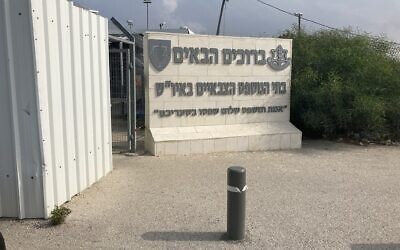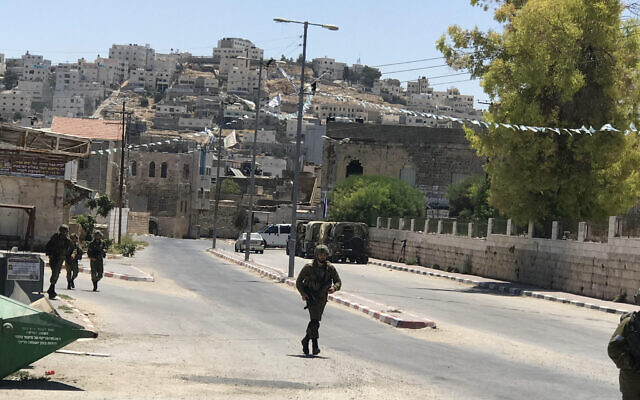OPINION: Equality before the law in the West Bank is shockingly absent
Former Board of Deputies president Vivian Wineman reflects on the two-tier court system he witnessed during a recent visit to Area C in the disputed territories.
Last month I returned from Israel where I had been on a study tour organised by Yachad – the pro-Israel, pro-peace group. I have been on numerous study trips to Israel before, most of which were designed to explain the policies of the then current Israeli governments and give the attendees material to enable them to deal with criticism of Israel – on campus or in the media.
For reasons that will become clear, I want to mention just one of these trips. It was organised by the Board of Deputies at the end of 1995. Its timing was interesting as it was just after the assassination of Yitzchak Rabin. The Israeli government was trying to advance the peace process and the questioning from our group, in which I participated eagerly, was whether such a goal was desirable or even possible.
The Board of Deputies has a long reach and, as on other occasions, we were able to meet the president – at that time Ezer Weitzman. Weitzman was not known for being particularly dovish or eloquent but his words left a great impression on me.

He took a shine to our group and our meeting lasted a long time. He pointed out that since the foundation of the state which was then almost 50 years old, no government of Israel, however right wing, had ever laid claim to sovereignty over the West Bank or Gaza. In a private conversation with an Israeli ambassador I was subsequently advised that, strictly speaking, Israel’s position was that while such a claim existed Israel had never advanced it.
The Overton window has shifted recently with the Nation State Law and the subsequent proposed annexation of Area C which comprises more than 60% of the West Bank.
There is a desire in some quarters to grab as much land with a few Palestinians as possible. But Weitzman’s words resonated in my mind during this last trip which took in much of the West Bank. We saw many aspects of the occupation – Hebron, East Jerusalem and the checkpoints.
The one which interested me the most, however, was the court system.
Broadly speaking, there are two systems of law in Area C. There is a version of Israeli civilian law which applies to Jewish settlers in the area and military law which applies to everyone else, and in particular to Palestinians. The two systems are very different. To give just one example; the protections given to defendants under Israeli civilian law- the extent of habeas corpus access to counsel, etc, are much more extensive than to those under Israeli military rule.
Equality before the law is totally absent.

We were able to visit a military court which tries criminal cases against Palestinians. Courts are confusing places but we were able to make out what was happening. It was a preliminary application and the defendant was not present in court. He was applying for bail which was granted and set at 1,000 shekels.
The court proceedings were in Hebrew which, as a Palestinian, it appears the defendant could not understand, but a translation was provided for him by his lawyer, a Palestinian Israeli who appeared confident and capable.
This is significant as many Palestinians cannot afford their own representation; the proceedings are carried on in a language they often do not understand and translations are sometimes patchy. Frequently what is at stake is their ownership of their property or their right to build on it (which is denied in 95% of cases) the results even before the election were unfortunate.
What was interesting, in the case we saw, was the charge against the defendant. It was trespass. He had trespassed on land, which he himself had owned until recently. It seems it was appropriated by the Israel Defence Forces (IDF) for use as a firing range.
This raises so many questions. What is the process by which the land was appropriated. Why was his land selected? Did the defendant have a right to contest the ruling? Or a right of appeal? Was compensation offered? How was it assessed? Did the defendant accept it? How permanent is the appropriation? If temporary, will the defendant get his land back or will it be passed on to settlers?
The IDF appropriates a lot of land in the West Bank. How much is appropriated in Israel inside the Green Line? Is any of it taken from Jews? Or is it just Palestinians who are subject to this? Is it right that a man should be subject to criminal proceedings for stepping on land he used to own but which has been appropriated from him by a process whose legality is not universally acknowledged?
These questions are pertinent. In the Elon Moreh case in1979 the Israeli Supreme Court ruled that it was illegal for the government to appropriate Palestinian land directly for use by settlers. Since then the route by which several hundred thousand acres of land have been acquired for settlers, has been by appropriation by the IDF for military purposes and then its allocation to settlers.
Yachad, attempting to be fair, organised a number of meetings with government spokesmen and one with a settler who was the most convincing. Most of the spokesmen’s replies were pure whataboutery.
Things are worse elsewhere. Iran is a horrible place, what about the Uyghurs? What about Ukraine? Many of the Palestinians hate us and support Hamas. All true to some extent, but does this justify or have any relevance to what is being done here?
There are some who believe that the entire land is ours by divine gift, but many people both inside and outside the community do not hold that view or that this entitles the state to appropriate it.
Among them are not only many senior Israeli politicians but also many great rabbis and a previous director general of the Israeli Foreign Ministry. Whether they are right or wrong these people cannot all be dismissed as antisemites or self-hating Jews.
Unfortunately this debate is going to run and run.

Thank you for helping to make Jewish News the leading source of news and opinion for the UK Jewish community. Today we're asking for your invaluable help to continue putting our community first in everything we do.
For as little as £5 a month you can help sustain the vital work we do in celebrating and standing up for Jewish life in Britain.
Jewish News holds our community together and keeps us connected. Like a synagogue, it’s where people turn to feel part of something bigger. It also proudly shows the rest of Britain the vibrancy and rich culture of modern Jewish life.
You can make a quick and easy one-off or monthly contribution of £5, £10, £20 or any other sum you’re comfortable with.
100% of your donation will help us continue celebrating our community, in all its dynamic diversity...
Engaging
Being a community platform means so much more than producing a newspaper and website. One of our proudest roles is media partnering with our invaluable charities to amplify the outstanding work they do to help us all.
Celebrating
There’s no shortage of oys in the world but Jewish News takes every opportunity to celebrate the joys too, through projects like Night of Heroes, 40 Under 40 and other compelling countdowns that make the community kvell with pride.
Pioneering
In the first collaboration between media outlets from different faiths, Jewish News worked with British Muslim TV and Church Times to produce a list of young activists leading the way on interfaith understanding.
Campaigning
Royal Mail issued a stamp honouring Holocaust hero Sir Nicholas Winton after a Jewish News campaign attracted more than 100,000 backers. Jewish Newsalso produces special editions of the paper highlighting pressing issues including mental health and Holocaust remembrance.
Easy access
In an age when news is readily accessible, Jewish News provides high-quality content free online and offline, removing any financial barriers to connecting people.
Voice of our community to wider society
The Jewish News team regularly appears on TV, radio and on the pages of the national press to comment on stories about the Jewish community. Easy access to the paper on the streets of London also means Jewish News provides an invaluable window into the community for the country at large.
We hope you agree all this is worth preserving.






















